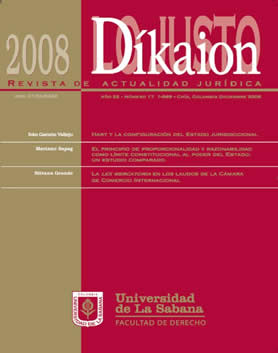Sistema jurídico, teoría del derecho y rol de los jueces: las novedades del neoconstitucionalismo
Keywords:
Neoconstitutionalism, legal system, theory of law, human rights, judicial power.Abstract
In this article I attempt to make a description and an assessment of some of the main contents of neoconstitutionalism. This new current is framed in post Second World War european constitutional law and in the work developed by national constitutional courts. Three main aspects are identified, that characterise neoconstitutionalism: the legal system’s transformation due to the normative value attributed to the constitution; the new theory of law that accompanies this event and the institutional role that judges begin to develop, following the new paradigm and causing the rise of new jurisprudence doctrines. I afterwards analize the possibilities and risks posed by the pattern of neoconstitutionalism. Firstly, it is suggested that the development of this current may notably contribute to the effective validity of human rights, by means of the judges’ active task. Secondly, two possible risks are pointed out: an excessively individualistic and relativist conception of human rights, and the possibility of a judicial activism that could affect the normal functioning of the institutional system. Finally, I report how the neoconstitutionalist theses have been received in the argentine constitutional law, specially in the 1994 constitutional reform and in some of the most recent cases adressed by the Supreme Court of that country.
Downloads
Downloads
How to Cite
Issue
Section
License
1. Proposed Policy for Journals That Offer Open Access
Authors who publish with this journal agree to the following terms:
This journal and its papers are published with the Creative Commons License Attribution-NonCommercial-NoDerivatives 4.0 International (CC BY-NC-ND 4.0). You are free to share copy and redistribute the material in any medium or format if you: give appropriate credit, provide a link to the license, and indicate if changes were made; don’t use our material for commercial purposes; don’t remix, transform, or build upon the material.






